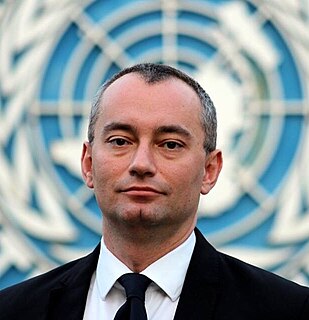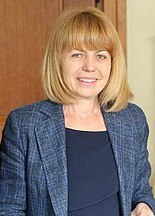
The politics of Bulgaria take place in a framework of a parliamentary representative democratic republic, whereby the Prime minister is the head of government, and of a multi-party system. Executive power is exercised by the government. Legislative power is vested in both the government and the National Assembly. The Judiciary is independent of the executive and the legislature.

Romania's political framework is a semi-presidential representative democratic republic where the Prime Minister is the head of government and the President is the head of state. Executive power is exercised by the President of the republic and the government. Romania has a multi-party system, with legislative power vested in the government and the two chambers of Parliament: the Chamber of Deputies and the Senate. The judiciary is independent of the executive and the legislature. Until 1989, the communist rule political structure took place in the framework of a one-party socialist republic governed by the Romanian Communist Party as its only legal party.

The Bulgarian Socialist Party, known as the Centenarian, is a social-democratic political party in Bulgaria and the successor to the Bulgarian Communist Party. It is a member of the Party of European Socialists with a pro-EU stance, although it has taken some euroskeptic positions and called for an end to EU sanctions against Russia. BSP is also a member of the Socialist International. It is Bulgaria's largest political party by membership.

France is a representative democracy. Public officials in the legislative and executive branches are either elected by the citizens or appointed by elected officials. Referendums may also be called to consult the French citizenry directly on a particular question, especially one which concerns amendment to the Constitution.

Elections in Cyprus gives information on election and election results in Cyprus.
Elections in Hungary are held at two levels: general elections to elect the members of the National Assembly and local elections to elect local authorities. European Parliament elections are also held every 5 years.

Elections in Lithuania gives information on elections and election results in Lithuania.

Elections in San Marino gives information on election and election results in San Marino.

The Portuguese local elections of 1985 took place on 15 December. They were the fourth local elections in Portugal since the democratic revolution of 1974 introduced the concept of democratic local power.

Bulgaria elected its members of the European Parliament in a by-election on 20 May 2007. It was the country's first European election, having joined the Union on 1 January of that year. The country still had 18 MEPs, no change from before the election. Until Bulgaria could hold these elections, the country was represented by MEPs appointed by the National Assembly.

Parliamentary elections were held in Bulgaria on 5 July 2009. With 40% of the vote, the decisive winner of the elections was the established in 2006 personalistic party of Boyko Borisov - GERB. The Socialist Party, in power before the election, was in second place, with around 18%. Оnce-ruling National Movement Simeon II did not cross the 4% threshold and won no seats. The turnout was 60.2%, one of the lowest ever. Following the election, GERB leader Boyko Borisov became Prime Minister. Just like all the previous parliamentary elections since the fall of communism, the government was not re-elected.

Yordanka Asenova Fandakova is a Bulgarian politician and Mayor of Sofia. She is the first woman to hold this position. She was elected on 15 November 2009, after defeating the Bulgarian Socialist Party contender Georgi Kadiev. Fandakova is a member of the conservative GERB party.

Tsetska Tsacheva Dangovska is a Bulgarian jurist and GERB politician who is the current Minister of Justice of Bulgaria as part of the Third Borisov Government, having assumed office on 4 May 2017. She had previously held the position of Chairwoman of the National Assembly of Bulgaria on two occasions. Tsetska Tsacheva is the first woman to ever chair the National Assembly of Bulgaria since its establishment in 1878.

A presidential election was held in Bulgaria on 23 October 2011, with a runoff held on 30 October 2011. No candidate won outright in the first round, resulting in a second round runoff between the eventual winner, Rosen Plevneliev of GERB, and Ivaylo Kalfin of the Bulgarian Socialist Party.

The Belgian provincial, municipal and district elections of 2012 took place on 14 October. As with the previous 2006 elections, these are no longer organised by the Belgian federal state but instead by the respective regions:

A referendum on building a new nuclear power plant was held in Bulgaria on 27 January 2013. Whilst it was not explicitly mentioned in the question, it was widely acknowledged that the referendum was about restarting construction at the Belene Nuclear Power Plant.

A referendum on introducing electronic voting was held in Bulgaria on 25 October 2015 alongside local elections. Although the referendum resulted was approved by a wide margin, turnout was far below the required threshold to make its result binding.

Parliamentary elections were held in Bulgaria on 5 October 2014 to elect the 43rd National Assembly. GERB remained the largest party, winning 84 of the 240 seats with around a third of the vote. A total of eight parties won seats, the first time since the beginning of democratic elections in 1990 that more than seven parties entered parliament. Boyko Borisov then became prime minister as head of a coalition with the Reformist Bloc and with outside support from the Patriotic Front and the Alternative for Bulgarian Revival.

Municipal elections were held in Milan on 5 and 19 June 2016 to elect the Mayor of Milan and the 48 members of the City Council.




















